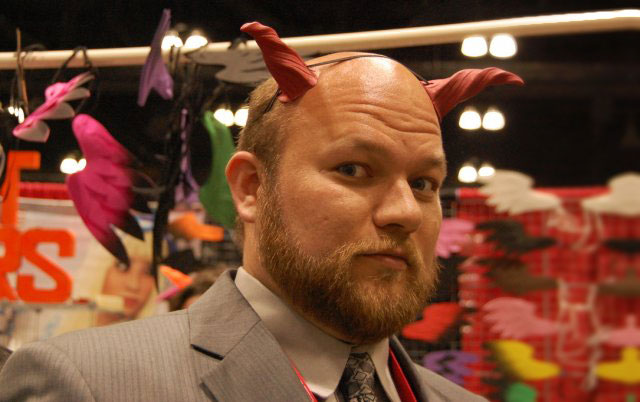
A federal judge has fined Texas lawyer Evan Stone $10,000 for sending out subpoenas and then settlement letters to people accused of sharing a German porn film called Der Gute Onkel—all without the judge's permission.
In September 2010, Stone brought suit on behalf of Mick Haig Productions against 670 accused file-swappers, and he asked permission to take early discovery. Judge David Godbey said no; instead, Godbey brought in the Electronic Frontier Foundation and Public Citizen to represent the interests of the Does, since none of them had yet been named and therefore had no counsel to speak for them. EFF and Public Citizen lawyers soon began hearing from people who said that Verizon had turned over their information to Stone, information generally obtainable only by subpoena.
The lawyers asked Judge Godbey to find out what was going on, and to sanction Stone if he had in fact issued subpoenas without the court's permission. Turns out that he had—at least four times. Godbey ruled (PDF) yesterday that Stone "grossly abused his subpoena power," obtained subscriber names he was not entitled to learn, and then, "almost unbelievably, Stone used the information he received to contact an unknown number of potential Does, presumably in the form of demand letters and settlement offers."
This wasn't even the first time Stone had run into subpoena problems. In a separate Texas lawsuit over anime, Stone sent a subpoena more than a month after the judge in that case withdrew permission to do so; even more shockingly, "Stone issued the subpoena on the same day that he voluntarily dismissed the underlying case," according to Godbey.
The judge's anger at Stone burns clearly throughout his order, especially when he sums up the entire situation:
To summarize the staggering chutzpah involved in this case: Stone asked the Court to authorize sending subpoenas to the ISPs. The Court said “not yet.” Stone sent the subpoenas anyway. The Court appointed the Ad Litems [EFF and Public Citizen] to argue whether Stone could send the subpoenas. Stone argued that the Court should allow him to - even though he had already done so - and eventually dismissed the case ostensibly because the Court was taking too long to make a decision. All the while, Stone was receiving identifying information and communicating with some Does, likely about settlement. The Court rarely has encountered a more textbook example of conduct deserving of sanctions.
Judge Godbey fined Stone $10,000, which he hopes will be enough to "deter similar misconduct and adequately reflects the gravity of the circumstances." In addition, Stone has to pay the attorney fees for EFF and Public Citizen, and must tell the court if he has settled with anyone in the Mick Haig case, and if so, for how much.
Finally, Stone has to send a copy of Judge Godbey's order to each judge overseeing any federal or state case in which Stone currently has a hand—whether or not it has to do with file-sharing.
Those are serious penalties, but as Judge Godbey noted, "The adage 'it is easier to ask forgiveness than it is to get permission' has no place in the issuance of subpoenas."
Stone has not yet responded to our request for comment.
Update: Stone tells me by e-mail, "After three rewrites, I finally decided I'm just going to have to let Justin Bieber do my quoting for me: 'Whenever you knock me down I will not stay on the ground.'"
reader comments
122